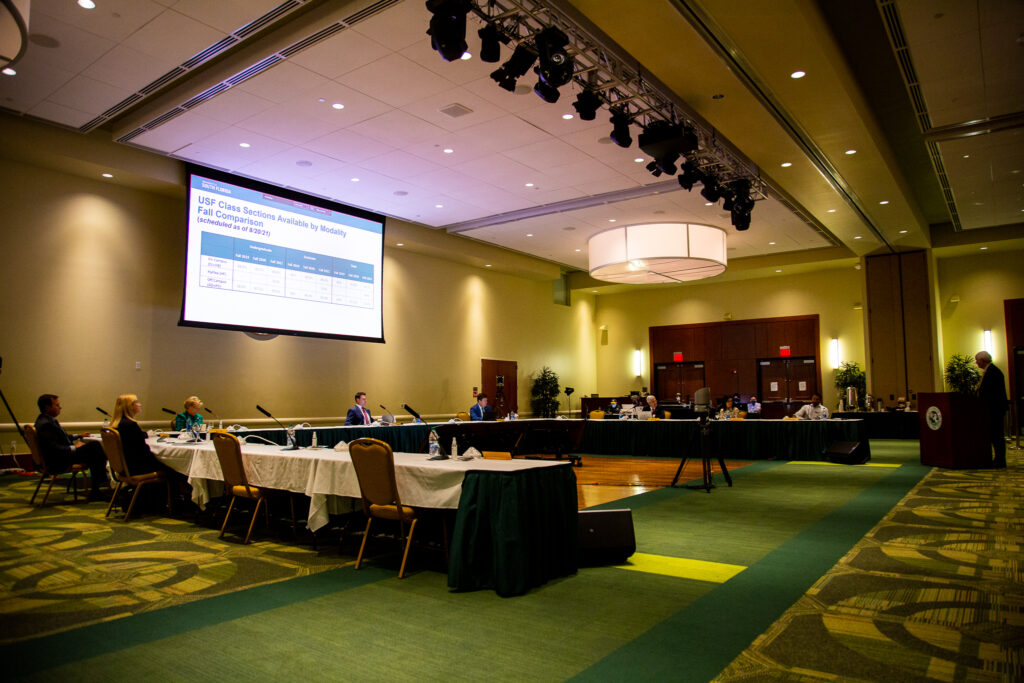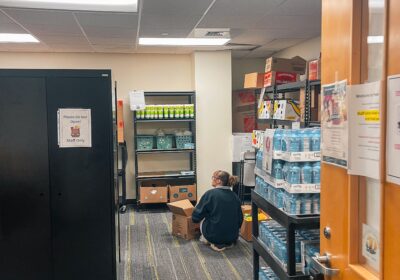Disagreements over current COVID-19 policies rise during Tuesday’s BOT meeting

Tensions rose within the last minutes of Tuesday’s Board of Trustees (BOT) meeting between Faculty Senate President Timothy Boaz and BOT Chair Will Weatherford on the university’s resumption of fall classes at full capacity amid a surge of COVID-19 cases across the state.
“On behalf of the faculty, I will express our extreme disappointment to the current approach to reopening campus in the context of a pandemic and, with the surge of cases due to the delta variant, [the approach] is not being conducted in accordance with the recommendations of the expert faculty at USF Health,” Boaz said.
“Likewise, we’re extremely disappointed that decisions of a modified approach are no longer being guided by science and data. Finally, and most disturbing, is the fact that our approach no longer has the health and well-being of our students, staff and faculty as its top priority.”
Boaz’s remarks came after the first day of fall classes Monday, when the university welcomed thousands of students back to full-capacity classrooms. Face masks are no longer required but “expected” across campus while social distancing inside classrooms isn’t enforced, which leaves some faculty members wary about the risks of new infections throughout the semester, according to Boaz.
“While most of our students were wearing masks as we indicated we would expect, we continue to have the problem that many courses are being taught packed in classrooms with no capacity for any physical distancing,” Boaz said.
Weatherford said he appreciated the feedback but disagreed with the claims that the university isn’t prioritizing the health and safety of its students. He emphasized the “legal constraints” placed on USF by the state government which prohibit the university from imposing its own COVID-19 policies.
“We appreciate the voice of the faculty, and we appreciate your voice. You’re on the Board of Trustees and we’re grateful for the transparency,” Weatherford said. “I only take issue with one thing you said that was at the very end. We do take the health of our students and our faculty and our administration to be the most important thing. That’s a responsibility we have as the board. I think everyone here takes that very seriously so I’m going to have to disagree with you on that one, politely.
“I think we’re all aware of legal constraints that we have at the university with regard to some of the actions that the Faculty Senate has called upon us to take.”
While Boaz was the only one in the meeting who showed concern for the university’s current approach and policies for the fall semester, he’s not alone.
The Advisory Council of Faculty Senates (ACFS) on Aug. 12 unanimously adopted a resolution petitioning Gov. Ron DeSantis to allow individual universities to implement their own COVID-19 mitigation measures based on their own community response.
The resolution, which was forwarded to the governor as well as the Florida Legislature, advocated for the health and safety of students, faculty and staff. From Aug. 13-19, the state reported over 150,118 COVID-19 cases and 346 deaths, leaving the state positivity rate at 19.8%.
Boaz said the council felt universities were in the best positions to gauge their own capacities for in-person classes as well as what their problems and issues were when making decisions to reopen campuses.
The resolution sent to DeSantis’ office was not the only one advocating for the same issue. This time, another resolution was drafted and sent to an address not as far as Tallahassee.
During a special Faculty Senate meeting Aug. 18, the senators adopted a resolution urging USF to require vaccination of students, faculty and staff across all three campuses as well as the use of face coverings and social distancing inside classrooms.
Due to the legal implications preventing such mandates, the resolution requested the university to maintain a “flexible approach to online course delivery that allows faculty to use virtual and hybrid modes of delivery until there is no greater than a moderate risk of transmission in schools in the communities surrounding the USF campuses.”
The resolution was passed on a 53-5 vote, during which faculty talked about their concerns with resuming in-person classes at full capacity.
“Based on the provisions of the [fall 2020 plan], we would not be fully opening for business at this time, and most instruction would be moved online during this recent surge. But this plan has been tossed out the window,” Boaz said. “Instead, we are charging ahead with a full slate of in-person classes, packed with students, an unknown number of whom are vaccinated and some not wearing masks.”
Weatherford said university faculty and staff should lead by example when it comes to mask wearing and following COVID-19 safety protocols. Amid the tensions between the state government, university leadership and faculty across the university, Weatherford urged the USF community to show “a little bit of grace” toward each other.
“We will have different opinions with regard to how we should be combating this,” Weatherford said. “I would agree with you that there are things you can and should be doing to adhere to the scientific data for how to prevent the spread of disease and that’s with vaccinations first, of which we are heavily encouraging both on campus and in the community, and also wearing masks.
“We have to lead by example, both with regard to wearing masks and getting vaccinated. We have to show a little bit of grace toward each other in the process knowing that not everybody views this the same way.”
While USF might be constrained by laws and policies already in place, Boaz said it doesn’t stop the administration from speaking out on the issue around COVID-19. In his closing statement, he emphasized the issues within the approach used by the university to resume fall classes.
“I will say, I appreciate very much everything that our administration has done and I am cognizant of legal constraints,” Boaz said. “That said, I think it’s incredibly important to speak out on this issue.
“I don’t mean for that to be a statement about people and their views, I’m talking about the approach not prioritizing the health and welfare of our community.”







